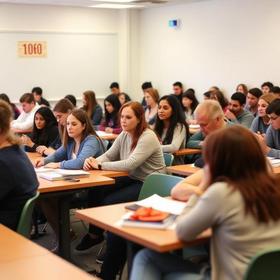- Beaufort County Community College is a public comprehensive community college with a commitment to provide accessible and affordable quality education, relevant training, and lifelong learning opportunities for the people served by the College.
School Highlights
Beaufort County Community College serves 2,492 students (27% of students are full-time).
The college's student-teacher ratio of 14:1 is higher than the state community college average of 13:1.
Minority enrollment is 50% of the student body (majority Black), which is more than the state average of 48%.
Quick Facts (2026)
- Enrollment: 2,492 students
- In-state tuition: $2,368
- Out-state tuition: $8,512
- Acceptance Rate: 75%
- Student-teacher ratio: 14:1
- Minority enrollment: 50%
- Source: Integrated Postsecondary Education Data System (IPEDS)
School Overview
The teacher population of 183 teachers has stayed relatively flat over five years.
Beaufort County Community College
(NC) Community College Avg.
Carnegie Classification
Associate's Colleges: High Transfer-Mixed Traditional/Nontraditional
Associate's Colleges: Mixed Transfer/Career & Technical-High Nontraditional
Institution Level
At least 2 but less than 4 years
At least 2 but less than 4 years
Institution Control
Public
Public
Total Faculty
183 staff
256 staff
School Calendar
Student Body
The student population of Beaufort County Community College has grown by 80% over five years.
The student-teacher ratio of 14:1 has decreased from 20:1 over five years.
The Beaufort County Community College diversity score of 0.65 is less than the state average of 0.66. The school's diversity has grown by 21% over five years.
Total Enrollment
2,492 students
2,579 students
Student-Teacher Ratio
14:1
13:1
# Full-Time Students
679 students
766 students
# Part-Time Students
1,813 students
1,813 students
# Enrollment Undergraduate
249 students
316 students
# Full-Time Undergraduate Students
679 students
766 students
# Full-Time Graduate Students
n/a
22 students
# Part-Time Undergraduate Students
1,813 students
1,990 students
# Part-Time Graduate Students
n/a
3 students
Total Dormitory Capacity
n/a
717 students
% American Indian/Alaskan
n/a
1%
% Asian
n/a
3%
% Hispanic
11%
13%
% Black
29%
21%
% White
50%
52%
% Hawaiian
2%
1%
% Two or more races
2%
3%
% Non Resident races
n/a
1%
% Unknown races
4%
5%
Diversity Score
0.65
0.66
College Completion Rate (Students who graduate in less than 4 years)
45%
37%
College Completion Rate (Students who graduate in 4 years or more than 4 years)
n/a
43%
Average Graduate Earnings (10 Years)
$27,900
$27,500
Tuition and Acceptance Rate
The public in-state tuition of $2,368 is less than the state average of $3,915. The in-state tuition has declined by 5% over four years.
The public out-state tuition of $8,512 is less than the state average of $9,508. The out-state tuition has stayed relatively flat over four years.
In-State Tuition Fees
$2,368
$3,915
Out-State Tuition Fees
$8,512
$9,508
% Students Receiving Some Financial Aid
76%
82%
Median Debt for Graduates
$11,716
$11,865
Median Debt for Dropouts
$8,000
$5,846
Acceptance Rate
75%
82%
SAT Reading
n/a
488
SAT Math
n/a
498
ACT Composite
n/a
20
ACT English
n/a
13
ACT Math
n/a
16
Source: 2024 (or latest year available) Integrated Postsecondary Education Data System (IPEDS) , School Administrators
School Notes
- Beaufort County Community College is a public comprehensive community college with a commitment to provide accessible and affordable quality education, relevant training, and lifelong learning opportunities for the people served by the College. Beaufort County Community College began with the operation of a practical nursing program in 1949, under the direction of the State Vocational and Adult Education Department. From 1962 to 1968, the College operated as extension units of Pitt and Lenoir Community Colleges. In December, 1967, the College was officially chartered as Beaufort County Technical Institute. The vocational and technical programs of the College were complemented by a college parallel program which opened in 1968 in conjunction with East Carolina University. In 1979, community college status was granted, and since then, Beaufort County Community College has functioned as a comprehensive community college offering continuing education and awarding associate degrees, diplomas, and certificates. When you arrive on our campus, you can expect affordable quality programs, student-oriented instructors, and accessible services. We've dedicated ourselves to creating a community college that fosters respect for your needs and optimism for your growth. Beaufort County Community College is accredited by the Commission on Colleges of the Southern Association of Colleges and Schools to award Associate Degrees, diplomas, and certificates. The college is a member of American Association of Community Colleges North Carolina Community College System.
Frequently Asked Questions
How much does Beaufort County Community College cost?
Beaufort County Community College's tuition is approximately $2,368 for In-State students and $8,512 for Out-State students.
What is the acceptance rate of Beaufort County Community College?
The acceptance rate of Beaufort County Community College is 75%, which is lower than the state average of 82%.
Recent Articles

Part-Time vs. Full-Time Enrollment in 2025: Which Is Better?
Explore part-time vs. full-time enrollment in 2025, comparing costs, flexibility, outcomes, and goals to help students choose the right path.

How Community Colleges Use AI Tools to Support Student Success
Explore how community colleges are using AI tools in 2025 to improve advising, learning, retention, and student success.

Nontraditional Student’s Guide to Community College 2025
Comprehensive guide for nontraditional students at community college with updated tuition, support, careers, and success strategies for 2025.









